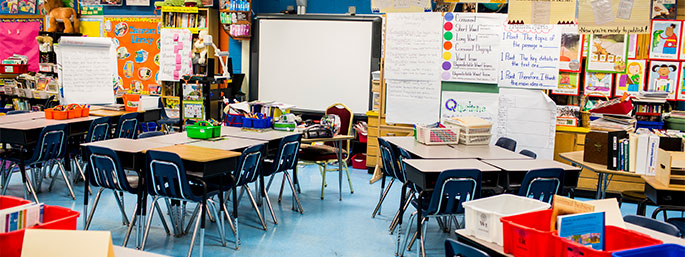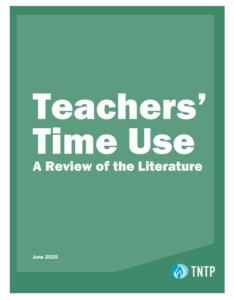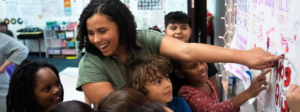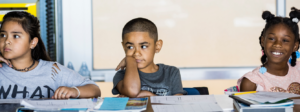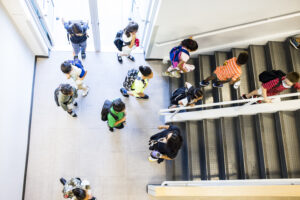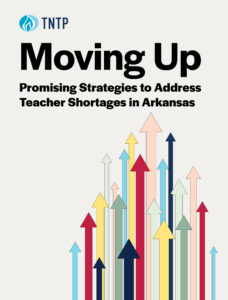This has been one of the most challenging years ever to be a teacher. Many teachers are teaching from their kitchen tables instead of classrooms, trying their hardest to keep students engaged from their homes. Others are in buildings, but navigating complicated routines and requirements to keep the school community safe. And every teacher is feeling the effects of the COVID-19 pandemic itself, whether they are mourning the loss of loved ones, coping with long-term isolation, facing financial struggles, or managing countless other anxieties.
Yet this year, like every year, educators stepped up to the challenge. This summer, we trained over 300 teachers in our Teaching Fellows programs—and we wanted to hear from them about how they are experiencing this year. Below are reflections from four of our teachers about their experience during the pandemic. You can learn more about Teaching Fellows—or apply to become one yourself—on the TNTP Teaching Fellows website.
Theodore Johnson
Fallstaff Elementary School, Middle School Science, Baltimore City Public Schools
I decided to become a teacher because my teachers growing up had such a huge impact on me. When I became a teacher, I wanted to create a space where students are pushed to be greater than what is normally expected. When people talk about student achievement, teachers are often making up excuses. I wanted to push all of my students to succeed.
Over the summer during Pre-Service Training, I sharpened a lot of my skills. The practice on Zoom learning and technology put me ahead of a lot of teachers in my school. I knew what it was like to do online learning both as a student and as a teacher. The Baltimore City Teaching Residency (BCTR) team has been so helpful throughout all of this. I’m in a cohort with other science teachers, and we’re really there for each other.
The most rewarding part of teaching this year is when students get excited. I see that sometimes when I use a piece of technology that works really well. “Mr. Johnson, are we going to do this or that today?” It feels great. But it can be hard to catch kids’ attention in the virtual classroom. I’m competing against so much. So I really have to focus on how to be as effective as I can during class time to keep students engaged.
I can’t wait to see my students in person. It will be so exciting to interact with them in a regular basis. I’m also looking forward to having more support from other teachers–to build relationships with them so I can get better.
Nathan David Clark
6th-8th Grade ELL and 6th Grade ELA, The Pat School, Indianapolis Public Schools
I majored in Public Relations and Journalism, but found that those jobs really weren’t doing it for me. I was a teacher’s assistant in a bilingual public school, and then decided to switch full time to teaching back here in Indy.
I’m not going to lie—summer school was really tough. Student engagement was a challenge. Kids are normally afraid to ask for help, and it’s even harder in the online context.
This whole year has gotten me to think more about the importance of social-emotional learning. Building relationships with students isn’t about buzzwords. You have to put in the work. You have to have empathy for students, to be there to listen. You have to be honest with students that not every day is going to be great. You work together and figure out how to get it done. You have to ask students how they’re feeling and let them know you’re here for them.
This experience has led me to realize that the system isn’t just broken—it was never designed to work well for everyone. Our work, what we do everyday, is so important.That is so motivating.
I can’t wait to give my kids hugs and tell them they matter. I dropped off gifts for some of them, but seeing them in person will be amazing.
Jennifer Winters
9th-10th Grade ELA, Carver Vocational-Technical High School, Baltimore City Public Schools
I actually used to be a college professor, but I didn’t feel like I was doing what I was called to do. I felt like I had gotten away from my mission of helping underserved kids.
I thought BCTR adapted the pre-service training to online so well—I had a lot of experience with Zoom and online learning before the year started, which helped so much . Still, it was hard, especially to start. There were tons of technical problems. Especially when students were reluctant to come off camera, I felt like I was talking to myself in my basement.
It has been so rewarding getting to know my students. It feels so good when they ask if I can be their teacher next year. I can really see how they’ve grown over the year. Students who told me they don’t like to read are now asking me for books. I feel so lucky that they’re ninth graders, and I’ll get to see them for three more years.
It’s been a tough year, for sure. But I love it. Even my worst day hasn’t been a horrible day. I’m head over heels in love with my students, and that makes it all worth it.
M. Troy Smith
6th-8th Grade ELA, Kindezi Academy, Indianapolis Public Schools
I was in the ministry for 25 years before deciding to become a teacher. I felt called to teach and to make a difference in the classroom.
PST was a bit overwhelming for me, to be honest. But it was a good experience. The Indianapolis Teaching Fellows team was gracious given the context of the pandemic, while still keeping expectations high. These sort of pressure moments reveal or conceal what is in you—for all of us, no matter what your title is.
We’ve been virtual for all but four weeks. I’ve been focusing a lot on social-emotional learning with my students. If we’re not here for students emotionally, we’re not here for them academically. And I’ve been seeing real benefits from that. Students are much more engaged in class due to the relationships I’ve built with them.
The most rewarding part has been seeing kids who were behind truly improve. From parts of speech to point of view narratives, they’re really getting better. It’s been so exciting to see.
Still, the distance has been hard. I wish I were fist bumping my students instead of being behind a camera. I admit it’s hard enough for me to stay engaged on a computer for a long period of time—I know it’s the same for them. I can’t wait to be back in person with them.
